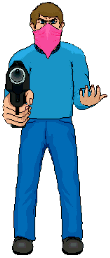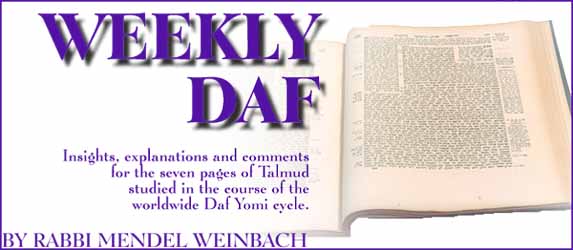Weekly Daf #91
Avodah Zarah 23-29 -- Issue #91
Week 8-14 Cheshvan 5756 / 1-7 November 1995
Rav Weinbach's insights, explanations and comments for the
7 pages of Talmud studied in the course of the worldwide Daf Yomi cycleTo Operate or Not?
| Rule 1 | Rule 2 | |
|---|---|---|
| The Rules: | A sick Jew who may or may not die if he does not receive medical treatment may not receive such treatment from an idol worshipper who is suspect of murder. The risk of dying at his hands is considered greater than that of dying as a result of not being treated. If his condition is so serious, however, that he is certain to die if not treated then he may receive such treatment. The short span of life he will enjoy by not submitting to this risky treatment is not a substantial consideration. | A Jew is trapped under a collapsed building on Shabbos and a medical examination determines that he has no chance of surviving. If we violate the Shabbos by removing the debris we will afford him the opportunity of living a little longer. This short span of life is enough to mandate the violation of Shabbos, which is permitted only for the purpose of saving life. |
| The Problem: | Why is a short span of life disregarded as a consideration in Rule One and accorded such importance in Rule Two? | |
| The Resolution: | Tosefos explains that in both cases we do what is best for the
one in need of help. In Case One giving decisive consideration
to a short span of life would result in his certain death as a
result of denying him the chance of full recovery from risky treatment.
In Case Two if we deny decisive consideration to such a short
span of life we condemn him to immediate death.
(This halachic principle is the basis for deciding on whether to do major surgery on a patient who will certainly die without the operation, but may die even earlier on the operating table.) | |
Two Brands of Bandits

 When Yaakov Avinu indicated to his evil brother Eisav that he
was traveling with him all the way to Seir while he actually parted
company in Sukkos he taught future generations to avoid being
harmed by dangerous company by misleading them as to their destination
and thus deluding them that they still have ample time to do the
harm they plan.
When Yaakov Avinu indicated to his evil brother Eisav that he
was traveling with him all the way to Seir while he actually parted
company in Sukkos he taught future generations to avoid being
harmed by dangerous company by misleading them as to their destination
and thus deluding them that they still have ample time to do the
harm they plan.
In Eretz Yisrael, the disciples of Rabbi Akiva were once accosted by Jewish highway robbers. Although they were actually headed for nearby Kaziv they told the robbers that distant Akko was their destination. When these disciples suddenly left them unharmed at Kaziv the outwitted robbers asked them who their teacher was. Upon learning it was Rabbi Akiva they exclaimed "How fortunate are Rabbi Akiva and his disciples that no evil man can ever harm them!"
A similar incident took place in Babylon when Rabbi Menashe, a disciple of Rabbi Yehuda, was met by burglars whom he told that distant Pumpedisa was his destination while he actually was headed for nearby Bei Tursa. When these bandits discovered they had been outwitted they angrily denounced him as being the disciple of "Yehuda the swindler." (This insolence was punished by a curse which brought failure to this gang for 22 years until they pleaded for forgiveness.)
Come and see, concludes the Talmud, the difference between the
burglars (generally less dangerous) of Babylon and the robbers
(generally more dangerous) of Eretz Yisrael. The former insulted
the sage whose disciple outsmarted them while the latter praised
him. (Rashi - to teach you the praise of Eretz Yisrael.)
General Editor: Rabbi Moshe Newman
Production Design: Lev Seltzer
HTML Design: Michael Treblow
© 1995 Ohr Somayach International - All rights reserved. This publication may be distributed to another person intact without prior permission. We also encourage you to include this material in other publications, such as synagogue newsletters. However, we ask that you contact us beforehand for permission, and then send us a sample issue.
This publication is available via E-Mail
Ohr Somayach Institutions is an international network of Yeshivot and outreach centers, with branches in North America, Europe, South Africa and South America. The Central Campus in Jerusalem provides a full range of educational services for over 685 full-time students. The Jewish Learning Exchange (JLE) of Ohr Somayach offers summer and winter programs in Israel that attract hundreds of university students from around the world for 3 to 8 weeks of study and touring.
 Copyright © 1995 Ohr Somayach International. Send us feedback.
Copyright © 1995 Ohr Somayach International. Send us feedback.Dedication opportunities are available for Weekly Daf. Please contact us for details.







